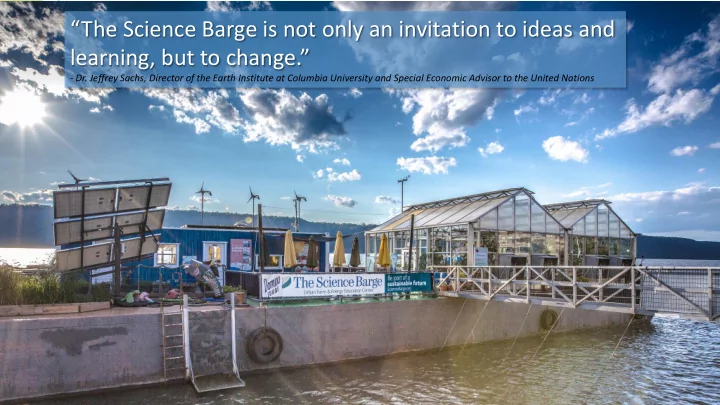

“The Science Barge is not only an invitation to ideas and learning, but to change.” - Dr. Jeffrey Sachs, Director of the Earth Institute at Columbia University and Special Economic Advisor to the United Nations
History Ted Caplow designed and directed the construction of the Barge in 2006 and launched the Barge on the Manhattan waterfront in 2007 The exhibits and ecological experiments that comprise the Barge float on a a steel deck barge, approximately 115 feet long, constructed in the 1940’s In 2009, the Science Barge was voted the Best Class Trip by New York Magazine Now in Yonkers, NY the Barge is easily accessible from public transportation and has contributed to the reinvigoration of the downtown Yonkers community
Press “…an educational lab for both schoolchildren in the New York City area and adults interested in learning about the technologies onboard.” “ Promoting high-yield, safe, and sustainable urban food production, the Science Barge educates students of all ages about how it is done .” “There are plenty of ways to learn about science within the city proper, but they’re likely not as concentrated or as exciting as they are on this floating classroom.” “Operating all year round, the barge could grow 20 times more than could have been produced by a field of the same size…” “…innovating today, while educating the innovators of tomorrow.”
Commercial Success
Why does Miami need the Science Barge? The Miami Science Barge is a Marine Innovation Lab. It’s a floating test bed and environmental education center that will provide an urban link to marine conservation and sustainability on Miami’s Biscayne Bay . Its unique platform brings students onto the Bay and promotes experiential learning through the lens of marine science. Its curriculum will focus on: • Health of the local and global environment • Sustainable food supply • Monitoring and data collection The goal of the Miami Science Barge is to stimulate the sustainable development of Miami. A city that can generate its own power, grow its own food, and recycle its own waste, helps secure our common future and sets the standard for cities around the world.
Program Marine Innovation Lab Ecological Restoration Citizen Science Technology Systems
Learn about our education impact – click here!
Restoration Stewardship and understanding of Miami’s ecosystems and local species is fostered by the restoration program Endangered organisms such as mangroves, seagrasses, and corals are cultivated on the Barge New methods and theories of growth are tested to investigate new, more effective methods Dynamic, changing exhibits encourage continued visitorship and will include an aquaculture hatching tank, coral nursery, and aquaponic plants Curriculum includes: local threatened species, tracking of population trends, human impact on the environment, roles of mangroves and seagrass in the ecosystem, biodiversity
Technology Renewable energy The Barge will acquire the majority of its energy from solar using passive tracking arrays Additional energy needs may be met with wind turbines and biofuel Hydroponic Systems Hydroponic and aquaponic systems provide the opportunity to learn about engineering and biomimicry Showcase Technologies Innovations from the Investors in Residence programs as well as technologies from other marine innovation competitions will be exhibited on the Barge Curriculum includes: energy storage in batteries, electricity and electromagnetism, U.S. energy profile, energy conservation actions, food production, and sustainable fishing
Ecological Systems Food Different feeds and hydroponic methods are tested in order to increase yield and sustainability Water The Barge’s hydroponic system as well as use of naturally provided freshwater make it an exemplary example of water conservation The rainwater cistern system provides the freshwater needed to fill aquaculture tanks and water all plants Natural Cycles The closed-water- loop demonstrates the earth’s ability to reuse nutrients and the chemistry necessary to make it happen Compost is a live demonstration of the nitrogen cycle and decomposition Curriculum includes: how hydroponics works, beneficial and bothersome local fauna, native plants, health benefits of fruits and vegetables, “food - print ”, global share of available freshwater
Citizen Science • The Barge activates the under-utilized waterfront, providing a unique teaching platform for learning about the conservation of Miami’s underwater ecosystems • Hands-on activities will include water quality testing, microorganism investigation via microscopes, growing barnacles and seagrass, etc. • Students will observe underwater activity with live video and learn about native species • Partners from local research institutions facilitate research projects for students to contribute to • Curriculum includes: scientific method, the metric system, proper measurement techniques, sampling bias, data collection methods
Programming • Day long field trips for K-12 students with Core Curriculum aligned materials • Public weekend tours led by high school interns • Evening and weekend workshops and lectures for adults • Networking events to connect Miami’s green workers
The Miami Science Barge
Project Status • 120’ x 30’ barge secured from Grady Marine • Site approval for Museum Park • Permitting: • City of Miami • Miami Dade County, DERM • State of Florida, DEP • Army Corps of Engineers • Anticipated launch: early 2016 • Systems build out and outfitting, Summer 2015 • Curriculum development, Fall 2015
Our Team Nathalie Manzano-Smith Karlisa Callwood Alissa Farina Project Lead Educational Programming Program Manager & Curriculum
Advisors Kenny Broad, PhD Ted Caplow, PhD Asha Loring Rachel Silverstein, PhD Dan Benetti, PhD Chair Creator CEO Executive Director Director of Aquaculture UM, Abess Center NY Science Barge Health in the Hood Biscayne Bay UM, RSMAS Nat Geo Explorer Waterkeeper Fran Bohnsack Gillian Thomas James Jiler Andrew Baker Director, South Atlantic CEO Executive Director Professor Gateway Frost Science Urban Greenworks UM, RSMAS US DOT
Partnerships District 3 Commissioner Audrey Edmonson District 2 Commissioner Marc Sarnoff Allen Family Foundation
For questions please contact: Nathalie Manzano-Smith Director of Innovation CappSci nathalie@cappsci.org (305)467-2987
Recommend
More recommend